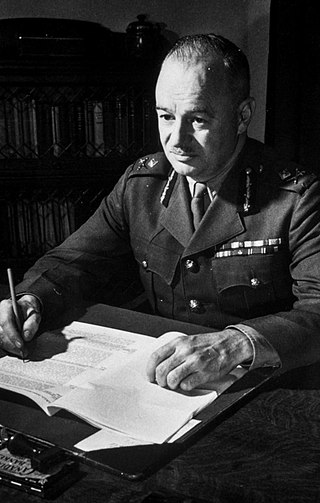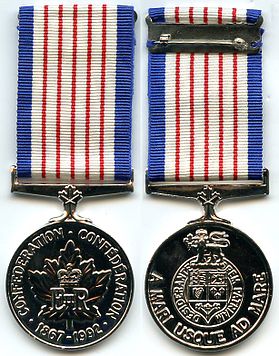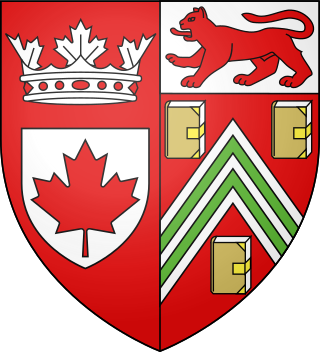Related Research Articles

James Jude Orbinski is a Canadian physician, humanitarian activist, author, and scholar in global health. Dr. Orbinski began his role as principal of Massey College at the University of Toronto in the 2024-2025 academic year, where he is also Full Professor in the Department of Family and Community Medicine in the Temerty Faculty of Medicine, and is cross-appointed to the Munk School of Global Affairs and Public Policy, as well as the Dalla Lana School of Public Health,. Previously a professor in the Faculty of Health Science at York University, Dr. Orbinski founded the Dahdaleh Institute of Global Health Research.

George Brock Chisholm was a Canadian psychiatrist, medical practitioner, World War I veteran, and the first director-general of the World Health Organization (WHO). He was the 13th Canadian Surgeon General and the recipient of numerous accolades, including Order of Canada, Order of the British Empire, Military Cross, and Efficiency Decoration.
Phil Gold is a Canadian physician, scientist, professor and author.

The 125th Anniversary of the Confederation of Canada Medal is a commemorative medal struck by the Royal Canadian Mint to commemorate the 125th anniversary of the Confederation of Canada and was awarded to Canadians who were deemed to have made a significant contribution to their fellow citizens, to their community, or to Canada. Nominations were submitted to lieutenant governors and territorial commissioners, senators, members of parliament, provincial governments, the Public Service Commission of Canada, the Canadian Forces, the Royal Canadian Mounted Police, and various federal government departments, as well as organizations throughout the country, and some 42,000 medals were awarded.
The Canadian Centennial Medal is a commemorative medal struck by the Royal Canadian Mint in 1967 to commemorate the 100th anniversary of the Canadian Confederation and was awarded to Canadians who were recommended by government, professional, educational and cultural associations, as well as military and protective services, veterans' groups, sports associations, and philanthropic and charitable bodies, for having provided valuable service to Canada. Some 29,500 medals were issued after its inauguration on 1 July 1967, of which 8,500 went to personnel in the Canadian Forces.

Robert Douglas Watt is a former Canadian museum curator and officer of arms who served as the first Chief Herald of Canada. He was appointed at the foundation of the Canadian Heraldic Authority in 1988, and he was succeeded by Claire Boudreau in 2007.

Insite is a supervised drug injection site in the Downtown Eastside (DTES) neighbourhood of Vancouver, British Columbia, Canada The DTES had 4,700 chronic drug users in 2000 and has been considered to be the centre of an "injection drug epidemic". The site provides a supervised and health-focused location for injection drug use, primarily heroin. The clinic does not supply any drugs. Medical staff are present to provide addiction treatment, mental health assistance, and first aid in the event of an overdose or wound. In 2017, the site recorded 175,464 visits by 7,301 unique users; 2,151 overdoses occurred with no fatalities, due to intervention by medical staff. The site also offers a free checking service so clients can check their substances for fentanyl and carfentanil. Health Canada has provided $500,000 per year to operate the site, and the BC Ministry of Health contributed $1,200,000 to renovate the site and cover operating costs. Insite also serves as a resource for those seeking to use a harm reduction approach for people who inject drugs around the world. In recent months and years, delegations from a number of countries are on record touring the facility, including various U.S. states, Colombia and Brazil. 95% of drug users who use Insite also inject on the street according to a British Columbia health official.

Steven Lewis Point, (Xwelíqwetel) is a Canadian academic administrator, criminal lawyer, and jurist. He is the current chancellor of the University of British Columbia. He served as the 28th Lieutenant Governor of British Columbia from 2007 to 2012. He also served as the chair of the advisory committee on the safety and security of vulnerable women, a committee that provides community-based guidance to the implementation of the recommendations from the Missing Women Commission of Inquiry.

HIV/AIDS was first detected in Canada in 1982. In 2018, there were approximately 62,050 people living with HIV/AIDS in Canada. It was estimated that 8,300 people were living with undiagnosed HIV in 2018. Mortality has decreased due to medical advances against HIV/AIDS, especially highly active antiretroviral therapy (HAART).
Juhn Atsushi Wada was a Japanese–Canadian neurologist known for research into epilepsy and human brain asymmetry, including his description of the Wada test for cerebral hemispheric dominance of language function. The Wada Test remains the gold standard for establishing cerebral dominance and is conducted worldwide prior to epilepsy surgery.
Alan Bernstein is Professor Emeritus at the University of Toronto and President Emeritus of the Canadian Institute for Advanced Research (CIFAR), where he served as President and CEO from 2012 to 2022. A Distinguished Fellow at the Munk School of Global Affairs and Public Policy, he is also a Fellow and Member of the Standing Committee for Science Planning at the International Science Council (2022-2025). Canadian Bernstein is recognized as a leader in health research, science policy, mentorship and organizational leadership.
AIDS Vancouver, founded in early 1983, is recognized as one of the first community-based non-profit AIDS organizations in Canada, responding to the HIV/AIDS crisis in the Vancouver area. Led by co-founders Gordon Price, Noah Stewart, Dr. Mike Maynard, Daryl Nelson, and Ron Alexander Slater, the organization has aimed to provide support, education, and advocacy for individuals affected by HIV/AIDS. With a focus on grassroots efforts and community mobilization, AIDS Vancouver has been involved in efforts to address the spread of HIV and support individuals living with the virus. In March 2024, AIDS Vancouver changed its purpose, values, and name to support and empower people living with HIV for years to come, and is now operating as Ribbon Community Society, with its programs and services remaining the same.

The Royal Canadian Mounted Police Long Service Medal was established by royal warrant on 6 March 1934 by King George V. It is the oldest continually awarded honour within the Canadian honours system, and the first created specifically for Canadian service within Canada. Initially proposed by the Royal North-West Mounted Police Veterans’ Association, it took more than ten years for the proposal to be realized. The determination of the veterans was aided by the interest of Commissioner Cortlandt Starnes and Prime Minister R.B. Bennett.
Julio S. G. Montaner is an Argentine-born Canadian physician, professor and researcher. He is the director of the British Columbia Centre for Excellence in HIV/AIDS, the chair in AIDS Research and head of the Division of AIDS in the Faculty of Medicine at the University of British Columbia and the past-president of the International AIDS Society. He is also the director of the John Ruedy Immunodeficiency Clinic, and the Physician Program Director for HIV/AIDS PHC. He is known for his work on HAART, a role in the discovery of triple therapy as an effective treatment for HIV in the late 1990s, and a role in advocating the "Treatment as Prevention" Strategy in the mid-2000s, led by Myron Cohen of the HPTN 052 trial.
Nigel Francis Scarth Rusted, was a Canadian medical doctor. He is credited with having made outstanding contributions to the medical profession in Newfoundland and Labrador.
Perry Kendall, is a Canadian Public health physician who was Provincial Health Officer (PHO) for the Canadian province of British Columbia's health ministry from 1999-2018 and was awarded the Order of British Columbia for contributions to Public health field and to harm reduction policy and practice.

The Medal of Service of the Order of Canada was a decoration, within the Canadian system of honours, created at the same time as the Companion level of the Order of Canada and the Medal of Courage of the Order of Canada. The federal cabinet refused to allow for the establishment of a multi-level national order, and thus the Medal of Service was established as a second tier to the Companion level.

Bonnie J. Fraser Henry is a Canadian epidemiologist, physician, and public servant who has been the provincial health officer at the British Columbia Ministry of Health since 2014. Henry is also a clinical associate professor at the University of British Columbia. She is a specialist in public health and preventive medicine, and is a family doctor. In her role as provincial health officer, Henry notably led the response to COVID-19 in British Columbia (BC).

André Pierre Picard is a Canadian journalist and author specializing in health care issues. He works as a reporter and a columnist for the national newspaper The Globe and Mail. As of 2020, he runs the news organization's office in Montreal. He currently lives in Vancouver.
Jean Gray is a Canadian academic and retired physician, who is professor emeritus of medical education, medicine and pharmacology at Dalhousie University. She has served as president of the Canadian and American Society of Clinical Pharmacology. She was invested as a Member of the Order of Canada in 2005, and has been a Fellow of the Royal College of Physicians since 2007. She was inducted into the Canadian Medical Hall of Fame in 2020.
References
- 1 2 Kendall, Perry (December 2007). "Dr John Blatherwick—An appreciation". BC Medical Journal. 49 (10): 578. Retrieved 10 February 2024.
- ↑ "Kitsilano's Pine Community Health Clinic taught important lessons". The Georgia Straight. 2013-07-04. Retrieved 2024-10-28.
- ↑ "Honorary Degree Citation" (PDF). Simon Fraser University. 7 October 2021. Retrieved 10 February 2024.
- ↑ "Dr. John Blatherwick's Advocacy During the Early Days of the AIDS Epidemic". 30 30 AIDS Vancouver on YouTube. 24 March 2014. Event occurs at 0m25s. Retrieved 10 February 2024.
I got to battle the AIDS epidemic from the front pages of the newspaper, on the evening news, radio and television, and all the talk shows.
- ↑ "PHS Community Services Society v. Attorney General of Canada". Supreme Court of British Columbia. 2008. Retrieved 10 February 2024.
- ↑ Bardsley, J.; Turvey, J.; Blatherwick, J. (February 1990). "Vancouver's needle exchange program". Can J Public Health. 81 (1): 39–45. PMID 2311049.
- ↑ Wainberg, Mark A. (November 2006). "The need to promote public health in the field of illicit drug use". CMAJ. 175 (11): 1395. doi:10.1503/cmaj.061404. PMC 1635773 .
- ↑ Pamela Fayerman (8 April 2003). "Global Virus SARS under control in B.C." The Vancouver Sun. Retrieved 10 February 2024.
- ↑ "2008 Honorary Degree Recipients | Graduation at UBC". graduation.ubc.ca. Retrieved 2024-10-28.
- ↑ "SFU 2021 Honorary Degree Recipients". www.sfu.ca. Retrieved 2024-10-28.
- ↑ "Golden Grad || John Blatherwick, '69 MD". www.ualberta.ca. Retrieved 2024-10-28.
- ↑ Naval Association of Canada (24 Feb 2021). "A History of Honours in Canada" . Retrieved 10 February 2024.
- ↑ John MacFarlane (2011). "John Blatherwick - Expert in Medals and Decorations" . Retrieved 10 February 2024.
- ↑ "Francis John Blatherwick's Order of Canada Citation". Governor General of Canada. Retrieved 8 April 2022.
- ↑ "2007 Recipient: Dr. Francis John Blatherwick – New Westminster". Government of British Columbia. Retrieved 8 April 2022.
- ↑ "Francis John Blatherwick's Golden Jubilee Medal Citation". Governor General of Canada. Retrieved 8 April 2022.
- ↑ "Francis John Blatherwick's Diamond Jubilee Medal Citation". Governor General of Canada. Retrieved 8 April 2022.
- Trailblazing doctor to retire: Public health took precedence over prudery, politics, business, By Don Harrison, The Province , Published May 29, 2007
- Blatherwick looking to spend time with family, By Kelly Sinoski, Vancouver Sun, Published May 29, 2007
- From SARS to salmonella, health officer never backed down, By Mark Hume, The Globe and Mail , Published May 29, 2007
- CANADA’S LONGEST-SERVING MEDICAL HEALTH OFFICER RETIRES, news release, Vancouver Coastal Health, May 28, 2007
- Kent, Heather (April 2002). "Captain Condom captures Vancouver". CMAJ. 166 (9): 1200. PMC 102380 .